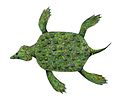Spitrasaurus
| Spitrasaurus Temporal range: Tithonian
~ | |
|---|---|
| Life restoration | |
| Scientific classification | |
| Domain: | Eukaryota |
| Kingdom: | Animalia |
| Phylum: | Chordata |
| Class: | Reptilia |
| Superorder: | †Sauropterygia |
| Order: | †Plesiosauria |
| Family: | †Cryptoclididae |
| Genus: | †Spitrasaurus Knutsen, Druckenmiller & Hurum, 2012 |
| Species | |
Spitrasaurus is an extinct genus of cryptoclidid[1] plesiosauroid plesiosaur known from the uppermost Jurassic of central Spitsbergen, Norway[2] and likely also Kimmeridge, England.[3] It is named after a syllabic abbreviation for Spitsbergen Travel.
The holotype of S. wensaasi is PMO 219 718 and consists of sixty articulated cervical vertebrae and skull material from a juvenile,[2] and the holotype of S. larseni is SVB 1450 and also consists of cervical vertebrae.[2]
A cervical vertebra, MANCH LI 5519c, was found in the Kimmeridge Clay Formation in England and was tentatively assigned to cf. Spitrasaurus in 2014 after being compared to Colymbosaurus megadeirus,[3] while more possible Spitrasaurus vertebrae found at Kimmeridge reside within the collection of Steve Etches.
See also
[edit]References
[edit]- ^ Benson, R. B. J.; Druckenmiller, P. S. (2013). "Faunal turnover of marine tetrapods during the Jurassic-Cretaceous transition". Biological Reviews. 89 (1): 1–23. doi:10.1111/brv.12038. PMID 23581455. S2CID 19710180.
- ^ a b c Espen M. Knutsen; Patrick S. Druckenmiller; Jørn H. Hurum (2012). "Two new species of long-necked plesiosaurians (Reptilia: Sauropterygia) from the Upper Jurassic (Middle Volgian) Agardhfjellet Formation of central Spitsbergen". Norwegian Journal of Geology. 92 (2–3): 187–212. ISSN 0029-196X.Low resolusion pdf High resolusion pdf
- ^ a b Benson, Roger B. J.; Bowdler, Timothy (2014-07-29). "Anatomy of Colymbosaurus megadeirus (Reptilia, Plesiosauria) from the Kimmeridge Clay Formation of the U.K., and high diversity among Late Jurassic plesiosauroids". Journal of Vertebrate Paleontology. 34 (5): 1053–1071. doi:10.1080/02724634.2014.850087. ISSN 0272-4634. S2CID 85066808.






